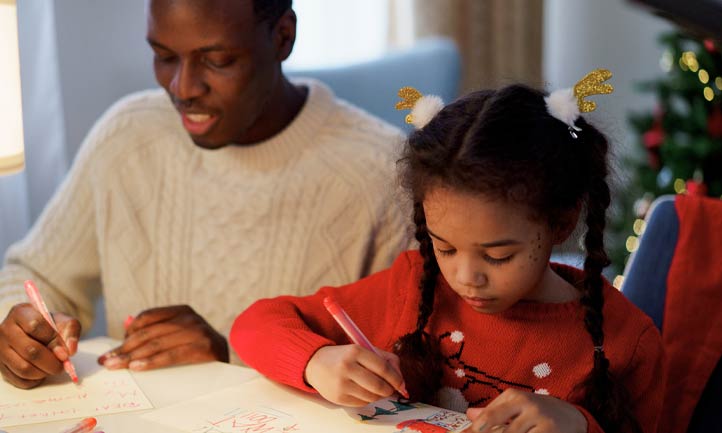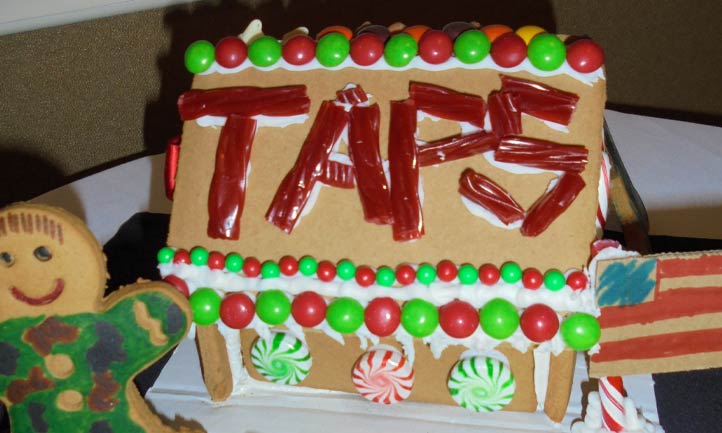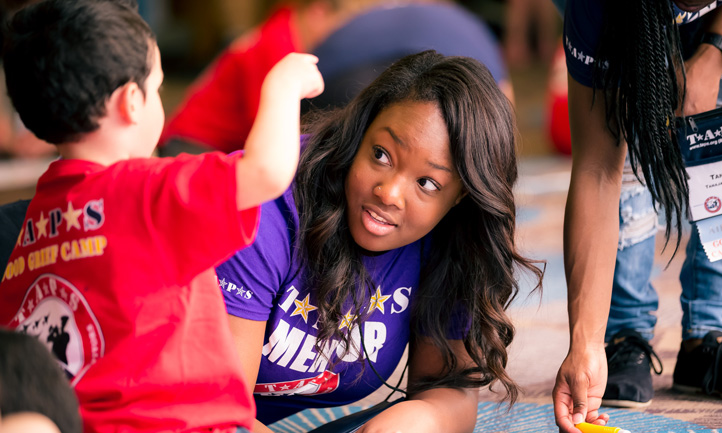Ways to Help Grieving Children During the Holidays
Authors: TAPS , Andy McNiel
As the holiday season unfolds, it brings a unique mix of emotions for children grappling with the loss of a loved one. Amidst the festive decorations and cheerful gatherings, these young hearts might find themselves in a whirlwind of sadness and joy, often struggling to make sense of these conflicting feelings. But we're here to help. Here are some comforting tips and ideas for families and children to navigate this challenging holiday season, offering ways to honor memories, share feelings, and find moments of joy amidst the grief.

Understand Children Grieve Differently
During the holidays, a child's grief can take on unique forms. They might fluctuate between sadness over the loss of a loved one and a desire to engage in the joy and festivities of the occasion. It's natural for them to have moments of happiness amidst their grief, especially on a holiday when the atmosphere is often focused on celebration. As caregivers, recognizing and validating these fluctuating emotions is essential. We need to reassure them that feeling a mix of sadness and happiness is perfectly normal. Children may not continuously exhibit grief as adults do, and their moments of play or laughter don't diminish the depth of their feelings. Being present for them — ready to listen or offer comfort — helps them feel supported in whatever emotions the holiday brings. Understanding and flexibility are crucial to helping children navigate their grief during these special times of the year.

Be Honest and Validate Their Experiences
If you're struggling with the holidays, sharing your feelings with your children is beneficial. They often sense these emotions, so it can be helpful to begin by asking something like, "I'm finding this holiday tough because I miss [our loved one]. How are you feeling about it?" This honesty validates their experience and strengthens your bond, making it easier to navigate the holiday season together. Children are intuitive about the emotions around them and might not talk about the loved one they've lost to avoid causing you distress. Encouraging them to share their thoughts and feelings can alleviate their worries and foster a closer connection, providing comfort for both of you during this sensitive time.

Make a Plan
When navigating grief during the holidays, making a plan that considers each family member's needs is helpful. Discuss how you'd like to celebrate, acknowledging that everyone's approach to grief and holiday observances might differ. This plan should include strategies for moments when someone might need a break due to grief, especially for children who may feel anxious as the holidays approach. Share your plans with friends and family to help set supportive expectations. While you can't foresee every detail, a thoughtful, flexible plan can provide comfort and structure, making the season more manageable for everyone involved.

Gather Support
In navigating grief during the holidays, it's beneficial for families to build a support network akin to a "village," particularly when caregivers are contending with their own emotional challenges. This network can include friends, neighbors, or extended family members who can offer additional support to children. Such support is vital, providing children with a reliable source of comfort and understanding, crucial for their emotional well-being. For caregivers, having this network means they're not facing the dual burden of managing their grief while solely supporting children. This approach ensures that every family member, both children and adults, receives the compassionate care they need during a time of loss, making the journey through grief a shared and more manageable experience.

Be Open to Change
During the holidays, as we navigate grief, it's important to be open to changing traditions while also considering the comfort that comes from maintaining familiar ones. This balance can be particularly comforting for children, who often find solace in the regularity and security of established routines. Encourage discussions with children about how they feel and what new traditions they might like to introduce to honor the memory of the loved one, such as sharing stories or preparing a favorite dish.
At the same time, keeping some traditions unchanged is perfectly OK, recognizing that a sense of normalcy is essential, especially for younger children. Remember, adapting to new rituals or keeping some old ones isn’t a permanent decision; you can always revisit and readjust. It's all about finding what brings your family the most comfort and connection during these times.
TAPS is here to Help

TAPS Youth Programs
TAPS offers support programs for children and teenagers grieving the death of a military family member. Led by caring professionals in child development, grief support, mental health, and education, TAPS Youth Programs provide safe spaces for surviving military children to be supported in their grief while also experiencing fun, adventure, mentorship, and camaraderie. We invite you to visit TAPS Youth Programs to explore available TAPS Youth Programs events, including Good Grief Camps, Family Campouts, online groups, and online workshops.
Andy McNiel, MA, is the Senior Advisor, TAPS Youth Programs.
Photos: Pexels, TAPS Archives
